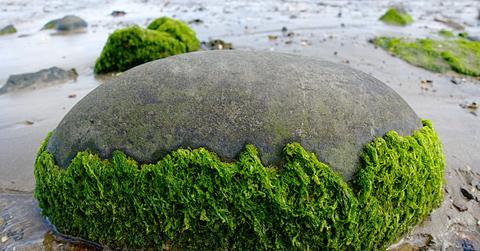How One Startup Is Turning Algae Into The Health Food Of The Future
"Fake food" and its long lists of chemicals generally has a bad reputation, but a former flavorist is hoping to change the conversation. His startup, Nonfood, is creating artificial food with algae to showcase how healthy synthetic options can be.
Updated May 25 2019, 5:32 a.m. ET
Eating seaweed or pond scum, commonly referred to as algae, won’t be the most attractive option on the menu. However, a new food startup called Nonfood is looking to prove that it can be used in a healthy artificial food. They’ve begun production on their first food item, a chocolate meal bar called Nonbar, and they hope it opens up an avenue for similar synthetic products.
The Nonbar is low in sugar and has high levels of protein and fiber. In fact, over half of the 80-gram bar is packed with the latter two ingredients. The bar itself is made out of spirulina, lemna, algae oil, and syrup. It may not have the pizzazz of a caramel-filled chocolate bar or a hot fudge sundae, but the goal is to simply get the wheels turning on algae being a food option.
“I think right now, a lot of people still think of it as pond scum, and we want to start a conversation about the fact that algae is actually a great food source,” Sean Raspet, a founder of Nonfood, told Food Navigator-USA. “It sounds kind of grandiose, but we want to rethink what ‘food’ is, what it could be. In future, can we provide platforms enabling people to produce their own food in their own homes?”
Algae already has a number of useful features outside of being edible. They can be used as an energy source through algae-based biofuels. Seaweed has been turned into plant fertilizer and livestock feed. It can also be reused as an enriched fertilizer when it’s used to catch runoff on farms. As a nutritious food item, it’s already been popularly used in Asian countries.
Raspet used to flavorist at Soylent, a company that created liquid food substitutes, or “food in a bottle.” He formed the idea of Nonfood from his previous job and is hoping to change the culture of “fake food.” In an interesting conversation with Bon Appetit, Raspet explains how food aroma can be deceptive, yet has a significance in our perception of flavor.
He compares this to the smell of recently mowed grass. Hexanal is a molecule created from the process, and it gives off a rather pleasant and fresh smell. However, that enjoyable aroma is actually “grass saying, ‘Help me!’ It’s a compound released by grass that’s all about communicating distress.”
There’s also a negative reaction to products that contain long-worded chemicals. When we look at ingredients of an artificially-created food item, it tends to get a little puzzling to see what we’re actually digesting. Raspet notes that if chemicals contained in natural foods were listed, it would look about the same. Pyridoxal phosphate, pantothenic acid, and butyl butanoate are just a few of the chemicals in an apple.
Prices will be higher for the healthier product. The Nonbar will retail for $5 and the company claims that they’ve received positive feedback from brick and mortar stores looking to sell the item. They’re also available in bulk -- five bars for $25 -- with free shipping straight from the company website.
